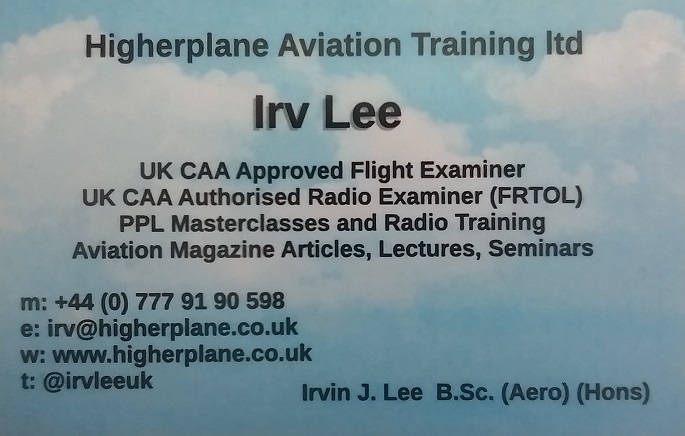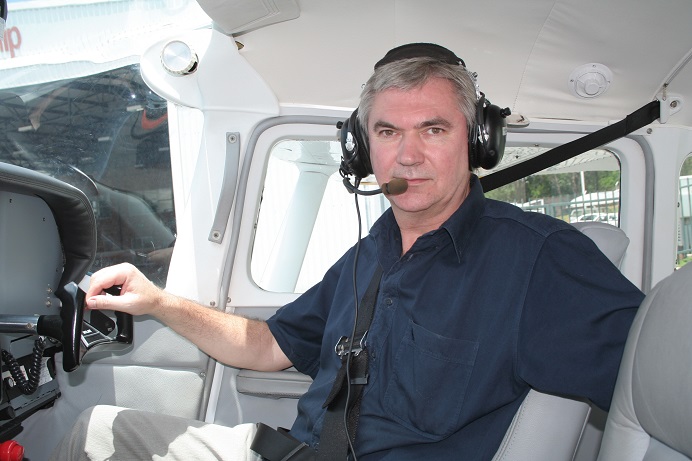
Irv Lee - Higherplane Aviation Training ltd - Radio Training
Mentoring the Private Pilot flying in the UK, Licence and Radio Testing, Renewals & Validations, PPL Masterclasses, Radio Training & Testing, South African Vacation & Licensing advice, Consultancy and much more besides . . . . .

'Radio' Offerings:
Via Zoom: Radio Training Course and if required, Practice FRTOL testsFRTOL practical tests, held at an approved location in Old Portsmouth
The next Zoom radio course is expected to run in late February/early March, or as soon as five students or pilots show interest in attending. The course, on Zoom, is usually divided into four 75 minute sessions split over two evenings. If there is demand from potential attendees, it can be given weekend daytime as three 100 minute sessions. Please get in touch for more details, and to be included in a 'keep informed' list. Students: if you become confident on the radio before starting Nav lessons, it really makes learning Navigation easier, but this course will give confidence whatever stage you are at. Qualified pilots, (there are some on every course), if poor radio is spoiling your flying, have a refresher with no exams to think about! (Please see the business card above for contact.) |
Zoom Course: UKP 99
Practice Test (on Zoom): UKP 50
Actual FRTOL Test in Portsmouth: UKP 135 (130 to course attendees)
UK Pilot Radio Training

The presenter, Irv Lee, CAA flight examiner and Instructor, and FRTOL (Radio Licence) examiner,
available at any airfield/airstrip by invitation in normal times, is now taking a very successful radio course for pilots online.
This live-presenter Radio Class (now Zoom-based) is aimed at providing a very reasonably priced and relatively enjoyable
route for pilots, student or otherwise, to the UK radio licence. It has now gone online due to the Covid-19 issues on
meeting up. Next Class dates/times, see the orange box at top of page,
please contact me for more details, there is absolutely no obligation to actually sign up.
The Zoom sessions have the same content as the classroom course that has made the radio licence tests easy for many students over a decade.
The course, updated to the latest release of the official CAP413,
consists of a small number of separate Zoom sessions (usually four) to total 300 minutes. Price is what is considered by attendees as a very reasonable UKP99 all in, handouts, pre-reading, this is very inexpensive for a course
covering such a wide topic, and it later includes personal individual support before any test, even if not tested by me.
At the end of the final session, there is a (free to attendees) live moving map demo of a cross country's sequence of calls,
typical of those needed to pass the practical test, and including controlled airspace and MATZ crossings,
VDF and emergencies. This demo will add approximately forty minutes onto the course at the end of the final session.
A reportedly-invaluable extra is (included in the cost) individual support for previous attendees just prior to their practical test,
even if that is months later with another examiner elsewhere in the country.
Note the new six section radio syllabus (SRG1171) is split into 6 different subsections
to be covered and signed off by your training school prior to a student attempting the FRTOL radio practical test. Section 1 of the syllabus is
that your school shows and explains to you the workings and documentation of the radio fit in
your training aircraft. After attending this course,
you will be given a certificate to say that the course covered sections 2 to 6
of the radio syllabus for your school to put into your student record. Therefore, with a school instructor
covering the physical radio installation that you are using, plus this course certificate,
your school can show a CAA auditor or your local radio examiner that
you covered all six sections of the radio syllabus, required prior to a FRTOL practical test.
This certification along with the quality of
the content presented is encouraging schools to recommend this course to their students.
| Comments from previous, attendees including PPL students, qualified PPLs wanting to improve, an SA PPL converting, and FAA PPLs needing to convert to UK licences now. "Really Good", "very helpful, has allowed me to put together a lot of my puzzle pieces" "Perfect length of lesson","Came across well polished... great to cover the syllabus", "(The content) worked really well for me as a beginner", " I really enjoyed the sessions today. Very good content", "A fantastic course I learned so much, which is a bit worrying as I should know as I am qualified with a radio licence! ", "Thoroughly enjoyed it, the context that you gave and demo at the end broadened the subject matter", "5 star, material spot-on, explanantion facilited understanding.. in addition to students, benefit of any non-UK trained pilot intending to fly in England", "Perfect length for me, I really like the way you split it into (3 or 4 sessions)", "...such an informative weekend", "... dropped in some real nuggets to add context to a lot of the 'by rote' calls I've been making", "pleasantly surprised at not only the content but the simple and practical way Irv explains things and what to look out for when listening - not only to ATC but other pilots and how certain phrases can be misconstrued!!","as an FAA pilot it was a great way to get to know the .... world of UK radio comms"... plus various exclamations live when something that had been confusing students during actual flights suddenly "clicked"! |
What has now been discovered by running it, is that the course is perfect for the ICAO licence holder (eg: FAA PPL) needing sufficient UK radio and airspace knowledge to have their UK validation application signed off by a UK examiner. (CAA Form SRG2140 for FAA pilots to fly Part21 aircraft here.)
Developed
because grass
roots student pilots were complaining that the standard tomes assume a lot of
pre knowledge about flying, for a decade this course has been both successful for, and enjoyed by, students and
qualified pilots who somehow forgot to add a radio licence to their NPPLs but now think it is time to get legal.
It would also be useful to any pilot without a background of flying in the UK. There is some pre-reading
so that some of the boring bits (eg: how to pronounce letters and numbers) can be studied outside the course
rather than slow it. There is no need to learn it before the course, just better to read it. The course will be suitable for a student who has just had a couple of flying lessons, students well into their flying courses, foreign pilots now based in the UK and converting, but also, passenger-partners have attended so that they can gain a radio licence to take the workload off their pilot-partner.
The
course
overs not only the syntax of a wide range of the radio calls that a pilot needs to gain a radio licence in the UK, and it has been remarkably succesful in doing that, but also making sure attendees understand the context and perhaps reason behind the call being what it is. There are tips in order to remember the format and order of the longer ones, and 'how to pass the tests'.
The course does include a demo by the presenter of the calls in a short moving map navex
including controlled airspace departures, MATZ and ATZ crossings, not mention emergencies and VDF use, typical,
but not a copy of the content of a radio practical test (similar to that published by the CAA in their safety leaflets).
The aim is to help pilots/students become confident on the radio, take the fear out of exams but not "teach to exams",
understand things that they might not personally use but overhear,
not be at all afraid to divert into a controlled field in deteriorating weather if it is the safest choice, etc.
Remember
a radio licence, known as a FRTOL,
Flight Radio Telephony Operators Licence is mandatory for private pilots with any UK issued flying licence using the radio, with the exception of balloonists in certain circumstances. Microlight student pilots are often misled by being told 'microlight pilots don't need a radio licence' which is simply not true, as they will find out if ever involved in an incident or ramp check. (It is true that students don't need a FRTOL, and they don't need one for application for an NPPL issue, but they do need a radio licence to legally use the radio once the NPPL is issued)
There is no compulsion to use the presenter for the actual tests, but these are available at an approved location in South East Hampshire if required. However, where-ever you take the test, very valuable pre-test individual support is provided for those who have attended a course, not matter how long the gap between course and test.
To enquire about the course, or book it, please contact me via the means on the card below.
Discount code for Pooleys Online http://www.pooleys.com/: Simply use "irvlee" in the "promotional code" discount field during checkout for prices to be recalculated downwards. 
|
Higherplane Aviation Training Limited
Registered Engand & Wales Company No. 04339387
